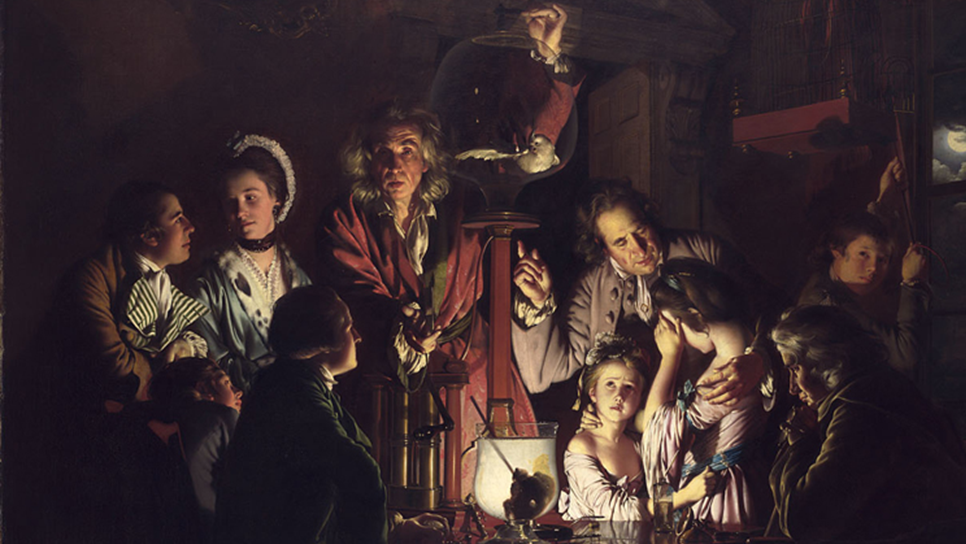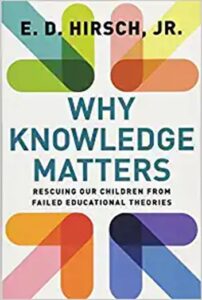by Veronica Werth

Critical Race Theory (CRT) has prioritized teaching that American institutions, laws, and history are inherently racist. Their race-based curriculum argues that white people are responsible for the barriers other races have encountered in education and that a correction requires changing the curriculum to reverse this trend emphasizing diversity and inclusion to gain “equity” in education. Under this premise, even math is racist.
But are the recommendations of CRT the solution? I submit it is not. On the other hand, I do agree there are things we can do to improve K-12 education in our country. But perhaps the answer lies in the educational methods in current use.
 The purpose of education used to be simple – mastery of reading, writing, and arithmetic, with knowledge of history, science, and the arts. However, the progressive agenda ignores what we know to be true about learning. E.D. Hirsch, Jr., tackles this issue in his book Why Knowledge Matters: Rescuing Our Children from Failed Educational Theories. He argues against the progressive view of education when he writes, “To make the emphases and content of the child’s early schooling largely dependent upon the child’s uniqueness is an idea unsupported by developmental psychology. The evidence for individual learning styles is weak to nonexistent. And in practice, the individualizing of the elementary-school classroom has led to fragmentation of the curriculum.” The use of pedagogical tools like Social Emotional Learning and Culturally Relevant Teaching used in our school has taken our schools farther away from teaching our students how to master the skills they need. Instead, schools should aim to recognize a child’s natural strengths and individual tastes, but not to use these to drive curriculum planning. Necessary skills should trump individual inclinations.
The purpose of education used to be simple – mastery of reading, writing, and arithmetic, with knowledge of history, science, and the arts. However, the progressive agenda ignores what we know to be true about learning. E.D. Hirsch, Jr., tackles this issue in his book Why Knowledge Matters: Rescuing Our Children from Failed Educational Theories. He argues against the progressive view of education when he writes, “To make the emphases and content of the child’s early schooling largely dependent upon the child’s uniqueness is an idea unsupported by developmental psychology. The evidence for individual learning styles is weak to nonexistent. And in practice, the individualizing of the elementary-school classroom has led to fragmentation of the curriculum.” The use of pedagogical tools like Social Emotional Learning and Culturally Relevant Teaching used in our school has taken our schools farther away from teaching our students how to master the skills they need. Instead, schools should aim to recognize a child’s natural strengths and individual tastes, but not to use these to drive curriculum planning. Necessary skills should trump individual inclinations.
Let’s take one of the skills: reading comprehension. To avoid the “Matthew Effect” (the good readers get better, and the poor readers get further behind), schools must insist on the fundamentals of reading comprehension. Hirsch demonstrates that the fundamentals of reading comprehension are not only fluency in decoding but a broad knowledge of subjects and good vocabulary. If the second grade is a reliable indicator of academic success in the 11th grade, we need content-rich curricula during early education to boost reading comprehension. To speed up learning, students must know more content. Those who don’t gain this at home must learn it at school. Teacher-directed content should focus student knowledge on concepts that every person should know and not individual interests. Furthermore, John Guthrie and colleagues published a study about concept-oriented reading instruction (CORI). They found that students’ reading comprehension improved when teachers planned for such things as quality texts, meaningful applications, and direct instruction during reading. If this is true, reading comprehension must be approached within a content-rich curriculum to help, especially, disadvantaged children. They need to experience the usefulness of vocabulary within a meaningful context.
However, a valuable education is more than just skills; a person needs factual knowledge. “In all societies, shared knowledge is the elephant in the room…[o]r to put the matter more precisely: romantic educators have misunderstood the principle of natural development (of education). Nothing is more universal and natural than the explicit transmission of communal knowledge,” wrote Hirsch in Knowledge Matters. He rightfully points out that every society realizes the importance of explicitly teaching shared knowledge to decrease the knowledge gap. Shared knowledge is not just information that answers what something is or how to do something, but why we study the subject. It is a necessary step in reaching equality in education and life. Children—especially the disadvantaged—who do not receive instruction in shared knowledge at home will never be fully initiated into the culture at large. Like the sacraments provide necessary initiation into the Church, so, too can the explicit teaching of our Western culture, grounded in a classical education model, provide a path towards the true, the good, and the beautiful. This approach offers a well-rounded Liberal Art curriculum.
Hirsch, despite being a socialist, is one of the foremost proponents of providing students with knowledge of Western culture. Unfortunately, while Hirsch provides empirical evidence against the current progressive curriculum and for a classical educational model, he does not go far enough to address the need for explicit moral teaching. Man is a social being, who has material and spiritual needs. Therefore, those who claim to support the needs of the whole child should agree that the fundamental aim of education is to initiate a child into the public sphere as a virtuous citizen.
The Classical Latin School in Kentucky states:
“Classical education is the inculcation of wisdom and virtue through a facility with the liberal arts and a familiarity with the Great Books.”
This is especially critical for a society whose governmental system allows a large percentage of its population to vote. Splintering learning into terms of identity groups will not help them assimilate, nor help our democratic republic succeed.
The question in the mind of many parents is how morality – and what morality – is taught and what the role of the parents is in this equation.
Cheryl Lowe, a critic of progressive curriculum and author of the article, “Factose Intolerance”, discusses how Enlightenment—and later Romantic thinkers—changed the accepted view that knowledge is a real and objective truth. On the one hand, David Hume, the Scottish Enlightenment philosopher, simplifies knowledge into extreme objectivity by claiming that math and science are the only true knowledge. This removed what it means to be human, dissolving man into an economic cog or scientific mechanism. On the other hand, Immanuel Kant, another Enlightenment philosopher, tried to rescue the view of knowledge, says Lowe, by claiming that people can only know what they know. This led to the extreme subjectivity that we are currently experiencing in progressive education. These ideas produced the practice of “constructing meaning” rather than “read and comprehend.” Any person attending teacher-preparation courses is all too familiar with student-led curricula, relegating the teacher to be no more than a referee while students “discover” knowledge about a subject. Taken alone, these polar views break us down into hyper-individualists, evidenced by the discord in the public sphere. “Both conscience and knowledge convey the idea of objective truth that exists outside the human mind,” writes Lowe, “which is the true end of education. Modern education philosophy no longer accepts the reality of objective knowledge, which is precisely why the modern educator can no longer educate.”
Contrast these extremes with the classical education model.
 Classical education concerns itself with the balance between how to teach, what to teach, and why we teach it. More specifically, it implements developmentally appropriate ways to maximize student understanding, teaches the core subjects for mastery, and balances these with continuous attention to students’ understanding of what it means to be made in the image and likeness of God. It is the act of passing on wisdom and virtues that have benefited the most amount of people for the longest amount of time.
Classical education concerns itself with the balance between how to teach, what to teach, and why we teach it. More specifically, it implements developmentally appropriate ways to maximize student understanding, teaches the core subjects for mastery, and balances these with continuous attention to students’ understanding of what it means to be made in the image and likeness of God. It is the act of passing on wisdom and virtues that have benefited the most amount of people for the longest amount of time.
The Classical education model applies objective and subjective realities simultaneously and reasonably. The sciences apply objectivity; the Arts rely on subjectivity. Students learn to understand that things which cannot be verified are not necessarily untrue (e.g., faith), and things inside one’s mind are not necessarily false (e.g., beauty). Combining objectivity and subjectivity leads to a balanced approach to knowledge. Therefore, schools should incorporate a coherent curriculum with range (scope) and chronological succession (sequence), utilize domain immersion, and conduct teacher-led discussions. These practices will avoid what Lowe describes as the denigration of knowledge for its own sake. Cramming random facts to pass a test is not education. Students need to comprehend the connection between life’s whole picture to its parts. In other words, what is the meaning of life and what is our purpose in it?
The empirical evidence shows that the Romantic ideals of a student-led curriculum are not working. As Hirsch wisely sums up in Knowledge Matters, “[i]t is the story of the victory of incorrect ideas, and of the disappointments that are bound to arise when reality is thwarted.” Instead, we see how a systematic approach to curriculum can benefit every child and can turn the tides of a revisionist curriculum. Unfortunately, CRT and the 1619 Project with their ideological curriculum are gaining momentum.
So, where do we go from here? We should begin a new crusade for the return to a classical model of education. First, schools must return to teaching man’s “unnatural subjects”—reading, writing, and mathematics—and as required skills to master. Second, students must be taught logic, rhetoric, science, and history as required subjects. Finally, schools must reestablish the true, good, and beautiful (i.e., virtues) to the center of our teaching, which Hirsch does not emphasize. We must return to God, as St. Thomas Aquinas revealed in “The Great Circle of Being”. Progressives have led many to believe that diversity comes from the individual. However, as Fr. Michael Gaitley, MIC writes in his book The One Thing in Three, God desires to see Himself reflected in His creation, the true source of diversity. So, let us return home, reminding others, as Fr. Gaitley does, “to take up our failed task of bringing all of creation back to the Father.” This can be done by rooting Christian culture within our educational curriculum, a proposition for which Christopher Dawson, Catholic historian, rightfully championed.
